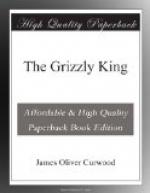Henry came from his bunk, bent and wobbling. He looked like a dying man, and for the first time Roscoe saw that his hair was gray. He was a little man, and his thin hands shook as he held them out over the stove, and nodded at Roscoe. The bearded man had opened his can, and approached the stove with a pan of water, coming in beside Roscoe without noticing him. He brought with him a foul odour of stale tobacco smoke and whisky. After he had put his water over the fire he turned to one of the bunks and with half a dozen coarse epithets roused Thompson, who sat up stupidly, still half drunk. Henry had gone to a small table, and Scotty followed him with the bacon. But Roscoe did not move. He forgot his hunger. His pulse was beating quickly. Sensations filled him which he had never known or imagined before. He had known tragedy; he had investigated to what he had supposed to be the depths of human vileness—but this that he was experiencing now stunned him. Was it possible that these were people of his own kind? Had a madness of some sort driven all human instincts from them? He saw Thompson’s red eyes fastened upon him, and he turned his face to escape their questioning, stupid leer. The bearded man was turning out the can of beans he had won from Scotty. Beyond the bearded man the door creaked, and Roscoe heard the wail of the storm. It came to him now as a friendly sort of sound.
“Better draw up, pardner,” he heard Scotty say. “Here’s your share.”
One of the thin slices of bacon and a hard biscuit were waiting for him on a tin plate. He ate as ravenously as Henry and Scotty, and drank a cup of hot tea. In two minutes the meal was over. It was terribly inadequate. The few mouthfuls of food stirred up all his craving, and he found it impossible to keep his eyes from the bearded man and his beans. The bearded man, whom Scotty called Croker, was the only one who seemed well fed, and his horror increased when Henry bent over and said to him in a low whisper: “He didn’t get my beans fair. I had three aces and a pair of deuces, an’ he took it on three fives and two sixes. When I objected he called me a liar an’ hit me. Them’s my beans, or Scotty’s!” There was something almost like murder in the little man’s red eyes.
Roscoe remained silent. He did not care to talk, or question. No one had asked him who he was or whence he came, and he felt no inclination to know more of the men he had fallen among. Croker finished, wiped his mouth with his hand, and looked across at Roscoe.
“How about going out with me to get some wood?” he demanded.
“I’m ready,” replied Roscoe.
For the first time he took notice of himself. He was lame, and sickeningly weak, but apparently sound in other ways. The intense cold had not frozen his ears or feet. He put on his heavy moccasins, his thick coat and fur cap, and Croker pointed to his rifle.
“Better take that along,” he said. “Can’t tell what you might see.”




